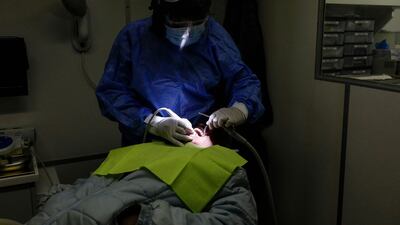Doctors have saved a man from having a potentially life threatening stroke when they discovered brain damage in his left hemisphere.
Manokurian Mathew, 40, visited Zulekha Hospital Dubai thinking he had a simple case of sinusitis.
After complaining about difficulty sleeping and headaches, he mentioned to the doctor that he had started being very forgetful. Concerned about the memory loss, the doctor recommended imaging the brain.
40
The results revealed two areas in the left hemisphere had been severely damaged by lack of blood flow.
Brain strokes are common in smokers, those with unidentified diabetes, hypertension and people with high cholesterol.
In Mr Mathew's case, the left internal carotid artery supplying blood to the brain had narrowed with a 70 per cent stenosis due to excessive cholesterol deposits.
Diabetes and lifestyle choices had placed Mr Mathew in the high risk category for strokes.
“Being a diabetic and a smoker has increased his risk of these infarctions," said Dr Shyam Babu Chandran, consultant neurologist.
Mr Mathew had assumed his history of right arm weakness was a symptom of exhaustion and poor sleep posture. The weakness had gone away after a few hours on both occasions, so he had not taken the episodes seriously.
"The two instances of right hand numbness experienced by him were a result of the repeated internal clotting that probably has formed and migrated from the left carotid plaque and impacted the nervous system," said Dr Shyam.
"In such cases it is very important to thoroughly evaluate and plan potential treatment to prevent future high-risk strokes.”
Once the issue had been identified Mr Mathews was schedule for a procedure called CAS (carotid angioplasty and stenting).
"The two hour long procedure was done through a minimal invasive puncture in the femoral artery," he said.
"Closely monitoring the patient after the procedure is very critical as there are chances of a sudden rush of blood through the cleared arteries that could cause a sudden stroke in the form of bleeding in addition to slowing of heart rate and low blood pressure."
The team of doctors successfully performed the operation and eradicated Mr Mathew's potential risk of stroke.
He was discharged the next day.
“It is great that Dr. Shyam was able to diagnose the hidden danger in left carotid artery and treat me correctly in time," said Mr Mathew in a statement.
"I was just assuming it could be only sinusitis or migraine. If the infarctions were unidentified, my career and entire life would have been in danger.
"This is important and I would advise anyone who has any unusual symptoms to immediately get yourself checked by a professional.”

